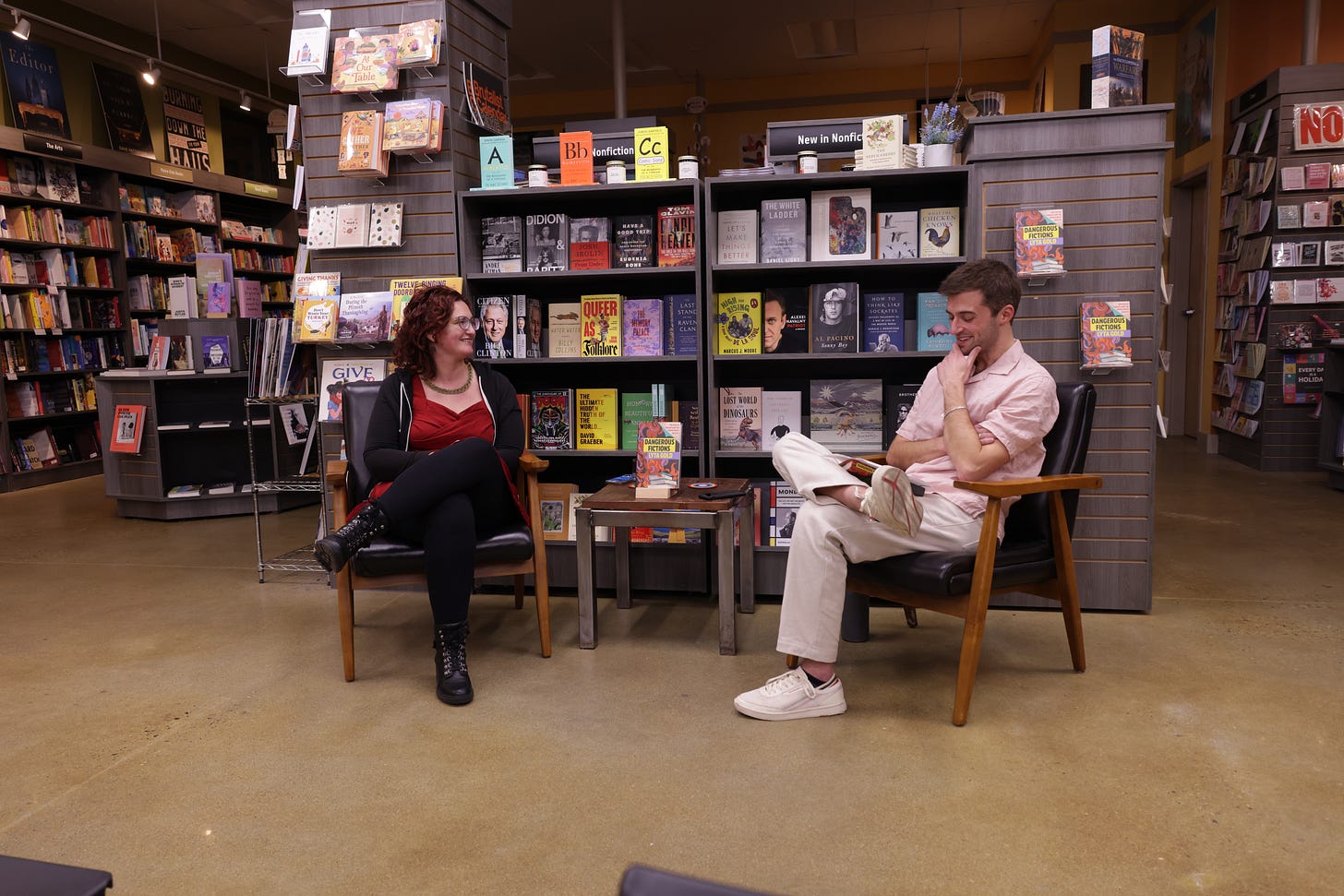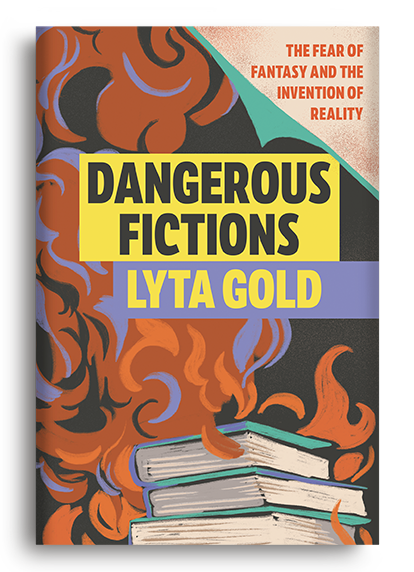Last month, Lyta Gold came to Portland on her tour for her work of nonfiction, Dangerous Fictions: The Fear of Fantasy and the Invention of Reality. At a time when stories seem to be constantly under attack, whether censored by book bans or threatened by the emergence of generative AI, Gold examines the history of censorship across time and unravels the power people understand stories to have. I was thrilled to speak with her at Print: A Bookstore for the event and have excerpted here our conversation on the book, the state of literary criticism, and book bans.

There's a lot about book bans in the news. It's something that I think people who care about books see frequently. What got you interested in this subject?
It was because all these book bans were happening. I didn't have a ton of experience in the area, but I knew a fair bit about how there have been panics before. There was a big Satanic Panic in the 80s, and a lot of that was panic over D&D, and then books and songs that mentioned witchcraft or anything like that. There were these earlier versions too. When I was in high school, I saw the Molière play, Les Précieuses ridicules, about teenage girls who read too many novels, and they had these ridiculous, pretentious ideas about being falling in love, and what men were supposed to be like. There’s this anxiety about young women setting the terms. I saw the play as a teenage girl and thought, I don't think I deserve this. I'm sure I'm a little bit silly, but is this really something that's worth being afraid of?
So I was thinking about all these different panics about young people reading. What are young people reading? How is it changing, how do they react, and how do they change the terms of reality? I found a lot of crazy stuff through the research. The book could have been a lot longer. There’s a lot of stuff here.
This is a culture with a long tradition—you date it back to Plato.
Yeah, I had to restrict myself to the Western tradition of it. Other cultures had book bans. I talked to a friend of a friend who's an expert in Chinese history, and she said every time there was a change of the dynasties there was a big wave of bans.
I saw the play as a teenage girl and thought, I don't think I deserve this. I'm sure I'm a little bit silly, but is this really something that's worth being afraid of?
There is a very specific kind of tradition that goes back to Plato, and a lot of people are recapitulating his ideas consciously or not. A lot of the time, it is deliberate. They know these arguments and that they are repeating these ideas. What's crazy is it even goes back to slightly earlier than Plato, in very early written language. There are excerpts from early philosophers who are worrying about the impact of people reading—what is it going to mean?
The panics have gone broad to small. Plato is really talking about all art. He's worried about how painting and poetry are going to fool people. In seventeenth century France, they were worried about novels, and later on people were just worrying about certain kinds of novels and movies, and it gets narrower and narrower. Now I think it's opening up again into fear of all these different genres.
You even get into AI and the future of storytelling. It seems like there's the potential for this octopus to keep grabbing more things.
That’s a whole different issue, but one of the things I talk about a lot in the book is just how the sausage gets made. It’s a huge issue that writers don't get paid very much. As all of these attacks on writing are happening—libraries are under attack and schools are under attack, and writers’ books are getting banned-they're not getting paid much in the first place, and then AI is really exacerbating and accelerating it. An AI novel doesn't have to be very good to flood the market and make it much, much harder for people to get paid.
What you see, especially in genre fiction, is writers writing really fast. People are putting out novels every couple months because they have to make ends meet. That’s another huge problem. It causes censorship because people have to write to the market.
You raise an interesting point about the capital behind it. We’re not doing this in a vacuum. Writers need to make money. Art isn’t separate from the economy.
Within that, I think there’s a conversation about the role of cultural criticism and how that uplifts or has a conflicted relationship with art. What do you think about the state of literary criticism?
It’s such a mess. I get really frustrated. People get really excited about pans, really devastating literary takedowns, and I used to really like them too. Then I was reading one at a certain point and was like, What am I doing? I hadn't even read the book that it was about, but I was really enjoying the snarkiness and wit and was like, yeah, get her ass. Then I thought, this is sick.
One thing I have noticed about the literary pan culture is that a lot of it is women critics and women writers. As both literary criticism and novel writing have gotten less remunerative, it's more women dominated, because that tends to happen when people don't get paid as much. As a result, people really fight each other. Ursula Le Guin is one of my favorite writers of all time, and Joanna Russ I also love a lot. Joanna Russ sort of hated Ursula and was really critical of her, but I love going back and reading Joanna Russ’s criticism because she's not just being mean for sake of being mean. She really thought Ursula could do better. Even though Ursula is my favorite, I can see that's valid. That I think is really missing. I can’t trust a good pan anymore because of the monetary and attention incentives behind it.
One thing I’ve been thinking about a lot is the power of fiction for action. I've come to think about the power on the individual level—that you can affect a reader—versus the collective level—effecting societal change. What power do you see fiction having on these two levels? Can it have the social impact, or is it really just on the individual? And how much does the individual level matter today?
That's a really good question, and it's really complicated because, historically, there are certain books or movies that had a huge impact on people. Birth of a Nation helped spark a lot of racist activity. Uncle Tom's Cabin, which is itself kind of a racist book, helped the abolitionist cause because a lot of white northerners really didn't know what was going on. They knew slavery existed, but they didn't know what it meant.
That I think is really missing. I can’t trust a good pan anymore because of the monetary and attention incentives behind it.
I think one of my theories—and sometimes people don't like to hear this—is that I don't know if that works the same way in contemporary culture. I think the info sphere, as it is, is drowning in TikToks that are lies about what's going on. There are still very popular movies, books, and TV shows, but I don't think that they have the same impact. When they do, they often do in really funny ways.
I bring up Lord of the Rings a lot because I'm a big nerd, but it's also really frustrating. It's one of the more significant pieces of right-wing art that we have. JD Vance and a lot of these guys love it, and they name companies after it. I think they pick up on some real fascist things in the text, but I don't think the books are fascist. As many crunchy, eco-socialists love Lord of the Rings as the fascists do. I have a chapter on fascists, and I think they read into the text what they want it to say. Sometimes it's there to some degree, and sometimes they just pull it out. Elon Musk kind of famously said that the Cyber Truck is the car that Blade Runner would drive. [Laughs] Blade Runner is not a guy.
Exactly.
That's one of the things that's so funny about these fake nerd boys—they don't seem to know it, but that's not the relationship they have with the text. They're using it to do the thing that they want to do anyway. He wants to sell his stupid, awful cars, so he uses this image, but I don't think that he sits and watches the original Blade Runner movie the same way you and I would sit and watch it. It's just not that relationship.
Going back to politics, I feel the sense of bracing and panic about what could be coming. We're having this conversation in an independent bookstore, your book is out with a small press. How can we use the tools of the literary community or of publishing to stand against censorship?
It's such a tough one because publishing is such a barbaric industry. You get a Penguin Random House CEO who’s anti book bans but pro AI. I think there are a couple things that need to be done.
On the local level, because book bans will probably continue to happen locally as they have been, there's all kinds of activism people can do to support their libraries. Showing up to school board meetings and library board meetings can really help on that basic level.
I think encouraging people to read books by marginalized writers—not because they're marginalized and the act of reading it will make you like a better person and more moral—but because these people need support, and because it's often really, really good. Getting back to your question about critical culture, one thing I've noticed on the other side is the excessive praise, like, this is an important book of queer fiction. And it's like, okay, is it good? I think it's actually really important to say, No, this is really good. This is a great queer book. It is a great book. It's not as much reading as a chore, but that it's a great work of art, and you'll like it, it's cool, it'll change how you feel. That, I think, is the better way to handle that.
Order Dangerous Fictions and follow Lyta’s newsletter here.
Reference Section
I saw Queer this week and absolutely loved it. The film is gorgeous, and I’m still mulling over its story of desire, perception, and reality.
I also just rewatched ¡Átame! —I’m a huge Almodóvar fan and, oddly enough, found that watching these two movies back to back sparked something interesting: on addiction, codependence, desire. The ending scene still haunts me (spoilers ahead!)
Note: I earn a small commission when you shop for books through my Bookshop links, and I appreciate your support, which helps keep Referential free.



This book sounds super interesting def gonna have to order